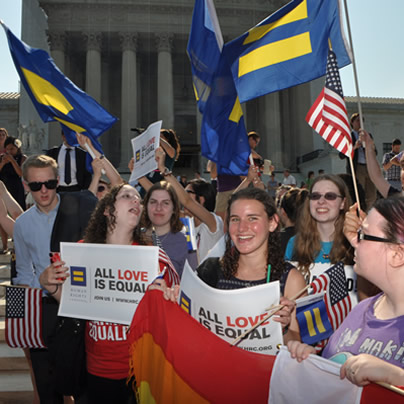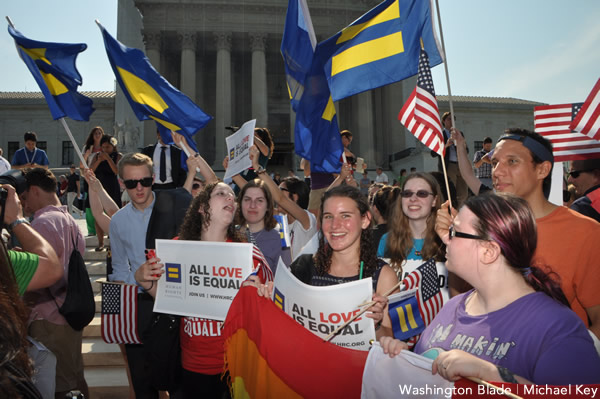News
Fed’l benefits issues linger post-DOMA for gay couples
Questions remain on Social Security, taxes, veterans benefits and family leave


Federal benefit issues for gay couples continue to linger after the Supreme Court ruling against the Defense of Marriage Act (Washington Blade photo by Michael Key).
Following the Supreme Court’s decision striking down the Defense of Marriage Act, the extent to which many federal benefits — taxes, Social Security, veterans benefits and family leave — will flow to married same-sex couples remains in question.
The Obama administration has extended certain benefits to married same-sex couples regardless of whether they live in the United States, but other benefits are still in limbo because of law, regulation or policy that determines whether a couple should be considered legally married.
Here’s a breakdown of these benefit categories and where they stand in terms of what’s obstructing their flow to married same-sex couples and what LGBT advocates see as the way forward:
1. SOCIAL SECURITY
Last week, the Social Security Administration announced for the first time it was starting to process retirement claims for married same-sex couples who apply for them in aftermath of the court decision on DOMA. But the extension of these benefits is limited.
On Friday, the agency published guidance indicating these benefits will flow to same-sex married couples living in states that recognize their unions, but couples that apply for these benefits in non-marriage equality states for the time being will have their requests placed on hold.
“Bill (the claimant) and Bob (the NH) marry in MA after MA recognizes same-sex marriage, but are domiciled Texas (TX),” the guidance says. “Bill files for husband’s benefits on Bob’s record. They meet all other factors of entitlement. Hold the claim.”
William “BJ” Jarrett, a Social Security spokesperson, confirmed on Monday the agency is processing some Social Security retirement spouse claims when the individual was married in a state that permits same-sex marriage and lives in a marriage-equality state at the time of application — or while the claim is pending a final determination. Still, he acknowledged other retirement claims are on hold.
“For all other claims, including Social Security survivors benefits, we continue to work with the Department of Justice on the development and implementation of policy and processing instructions,” Jarrett said. “We do, however, encourage individuals who believe they may be eligible for Social Security benefits to apply now to protect against the loss of any potential benefits.”
The reasoning for placing these claims on holds is statutory. Social Security law looks to the state of residence when a couple applies for benefits to determine if they’re married instead of looking to the place of celebration.
Even so, LGBT advocates say it’s possible for the Obama administration to interpret the Supreme Court ruling against DOMA in a broad way that allows them to offer Social Security benefits to a greater number of couples.
Michael Cole-Schwartz, a Human Rights Campaign spokesperson, indicated that no final decision has been with the assessment of these benefits as he encouraged the Obama administration to expand the benefits to additional couples.
“We are glad to see some couples getting benefits and that the door is still open for those couples living in non-marriage equality states,” Cole-Schwartz said. “We urge them to take the broadest interpretation to ensure the maximum numbers of same sex couples have access to benefits.”
Susan Sommer, a senior counsel at Lambda Legal, said her organization also believes gay couples in civil unions or domestic partnerships should also be eligible for Social Security benefits.
“We think that the laws reads for sure to includes those people who live in those states that have a civil union or domestic partnership, but waiting to hear from the Obama administration for confirmation on that point,” Sommer said.
But a statutory change may be necessary. In that event, Rep. Linda Sanchez (D-Calif.) has introduced Social Security Equality Act, which would enable gay couples to receive Social Security no matter where they live — even if their union isn’t a marriage, but a civil union or a domestic partnership.
“It is time for our government to stop telling gay and lesbian couples that they are second class citizens,” Sanchez said last week in a statement. “Same-sex couples pay into Social Security over the course of their working lives just like other Americans. They should receive the full benefits they have earned.”
2. TAXES
Another question is whether legally married same-sex couples throughout the country will be eligible for tax benefits — such as the exemption from the estate tax, the ability to jointly file and exemption from taxes on employer-provided spousal health benefits — in the wake of the DOMA decision. These couples are currently not receiving benefits if they live in states that haven’t legalized marriage equality.
That means if DOMA-lawsuit plaintiff Edith Windsor had moved to a non-marriage equality state like Alabama with Thea Spyer after marrying in Canada, she wouldn’t have been eligible for exemption from the estate tax as a result of her own lawsuit.
But what’s different about these benefits is that neither law nor regulation keeps these benefits from flowing to married same-sex couples that live in marriage equality states. It’s simply the policy of the Internal Revenue Service to look to the state of residence as opposed to the state of celebration in determining whether a couple is married.
Lambda’s Sommer pointed out that only policy is keeping the IRS from allowing these couples in non-marriage equality states to receive tax benefits entitled to other married couples.
“We are aware of no statute or even a regulation that prescribes a choice of law rule for determining the marital status for tax purposes,” Sommer said. “There’s no legal impediment to having the administration follow a place of celebration standard. It could so in addition to, say a place of domicile standard, which has been articulated in some tax court rulings, but still, in some circumstances, as a place of celebration rule.”
An IRS spokesperson referred to the statement currently on the agency’s website posted at the time of the Supreme Court in response to inquiry on whether IRS would implement tax benefits for married same-sex couples on the nationwide basis, regardless of their states of residence.
“We are reviewing the important June 26 Supreme Court decision on the Defense of Marriage Act,” the statement says. “We will be working with the Department of Treasury and Department of Justice, and we will move swiftly to provide revised guidance in the near future.”
3. VETERANS BENEFITS
Defense Secretary Chuck Hagel announced on the day the U.S. Supreme Court struck down DOMA that the Pentagon would comply the law to implement benefits for service members with same-sex spouses. But the question of whether veterans will be included as part of the package remains to be seen.
In U.S. Code, the Pentagon was previously unable to provide gay troops spousals benefits under Titles 10 and 32, which govern rights for service members, because of the Defense of Marriage Act. Now that the Supreme Court has struck down Section 3 of DOMA, those benefits should begin to flow.
However, the benefits under Title 38, which governs benefits for veterans, define spouse independently of DOMA in opposite-sex terms. Some of the benefits allocated under this law are disability benefits, survivor benefits and joint burial at a veteran’s cemetery. It’s unclear whether these benefits will begin to flow along with these other benefits because of the wording within the law.
Multiple media outlets are reporting that the Pentagon intends to have the benefits issue wrapped up by Aug. 31 along with the extension of benefits that were available under DOMA, such as military IDs, that were announced in February. Additionally, the U.S. Justice Department is required to file in McLaughlin v. Hagel, an ongoing DOMA lawsuit, to provide a status report by Sept. 9 on benefits afforded to gay troops addressing the Title 38 issue. An informed source told the Washington Blade the issue may be resolved as soon as this week.
Alex Nicholson, who’s gay and legislative director for Iraq & Afghanistan Veterans of America, said his organization has spoken about the issue with the administration and believes it has a “justifiable mandate” to afford these benefits to the legal spouses gay veterans.
“It’s not surprising that they’re taking their time to figure this out and do it right, but I think the mandate from the Supreme Court was clear enough that they could definitely move a little faster,” Nicholson said.
Lambda’s Sommer said the issue for gay veterans isn’t so much Title 38 because Title 1 of the U.S. Code should allow for a gender-neutral construction of this law. Still, she said other portions of the law related to veterans benefits could impact gay veterans seeking claims.
“In the veterans benefits area, there is also a statute kind of like what’s seen in the Social Security context that looks to the place of domicile at the time of celebration or when the right to the benefit has accrued,” Sommer said. “We’ll have to await guidance for how the administration will treat veterans who resided at the time of their marriage, and continue to live, in states that don’t respect their marriages.”
Lt. Cmdr. Nathan Christensen, a Pentagon spokesperson, said the Defense Department is working on the issue, but unable to provide additional information.
“The Department of Defense is working alongside the Department of Justice to implement the Court’s decision as quickly as possible,” Christensen said. “At this time no decisions have been made.”
In a statement provided to the Blade, the Department of Veterans Affairs similarly said the department was working to implement the benefits without providing anything conclusive on the extent to which they would flow.
“Our commitment to our Veterans and their families will continue to be our focus as we work to comply with recent Supreme Court decisions,” the statement says. “We are working closely with the Department of Justice to review relevant statutes and policies to implement any necessary changes to Federal benefits and obligations swiftly and smoothly in order to deliver the best services to all our nation’s Veterans.”
Here a change in the law may be required as well. The Charlie Morgan Act, introduced by Sen. Jeanne Shaheen (D-N.H.), would enable spousal benefits to flow to gay veterans. It was reported out of the Senate Committee on Veterans’ Affairs just prior to August recess.
4. FAMILY AND MEDICAL LEAVE
Yet another issue that related to family leave still persists a few days after the Labor Department issued guidance stating the Family & Medical Leave Act will apply to married same-sex couples in the wake of the Supreme Court decision against DOMA: Will the change apply to married same-sex couples in non-marriage equality states?
On Friday, Labor Secretary Thomas Perez issued guidance to department staff notifying them the Wage & Hour Division made the change as the result of the work with the Justice Department and calling the Supreme Court ruling against DOMA “a historic step toward equality for all American families.”
“As part of this process, the Department of Labor updated several guidance documents today to remove references to DOMA and to affirm the availability of spousal leave based on same-sex marriages under the Family and Medical Leave Act (FMLA),” Perez said. “This is one of many steps the Department will be taking over the coming months to implement the Supreme Court’s decision.”
The Family & Medical Leave Act entitles employees to take unpaid, job-protected leave for family and medical reasons with continuation of group health insurance coverage under the same terms and conditions as if the employee had not taken leave. Eligible employees are entitled to 12 work weeks of leave in a year-long period for the birth of a child or to care for spouse and up to 26 work weeks of leave to care for a service member with a serious injury.
But under current policy, this post-DOMA application of the Family & Medical Leave Act won’t apply to married same-sex couples if they place of residence doesn’t recognize same-sex marriage. A Labor Department official said the Wage & Hour Division’s Family & Medical Leave Act regulations define “spouse” for purposes of marriage as recognized under the state law where an employee resides. All that would be required for to change this policy is a change in regulation.
Tico Almeida, president of Freedom to Work, called on the Labor Department to update the regulations so same-sex marriages are recognized by the state of celebration for family and medical leave purposes.
“The couple that lives in Alabama, flies to New York City for the weekend to get married and returns to Alabama deserves to have the same FMLA rights as the gay and lesbian couples that live in New York City,” Almeida said. “We want a 50-state solution, and that means recognizing same-sex marriages by the state of celebration, even though current FMLA regulations recognize marriage by the state of residency.”

The Mexican Senate on Thursday approved a bill that would ban so-called conversion therapy in the country.
Yaaj México, a Mexican LGBTQ rights group, on X noted the measure passed by a 77-4 vote margin with 15 abstentions. The Chamber of Deputies, the lower house of Mexico’s congress, approved the bill last month that, among other things, would subject conversion therapy practitioners to between two and six years in prison and fines.
The Senate on its X account described conversion therapy as “practices that have incentivized the violation of human rights of the LGBTTTIQ+ community.”
“The Senate moved (to) sanction therapies that impede or annul a person’s orientation or gender identity,” it said. “There are aggravating factors when the practices are done to minors, older adults and people with disabilities.”
Mexico City and the states of Oaxaca, Quintana Roo, Jalisco and Sonora are among the Mexican jurisdictions that have banned the discredited practice.
The Senate in 2022 passed a conversion therapy ban bill, but the House of Deputies did not approve it. It is not immediately clear whether President Andrés Manuel López Obrador supports the ban.
Canada, Brazil, Belgium, Germany, France, and New Zealand are among the countries that ban conversion therapy. Virginia, California, and D.C. are among the U.S. jurisdictions that prohibit the practice for minors.
The White House
Four states to ignore new Title IX rules protecting transgender students
Biden administration last Friday released final regulations

BY ERIN REED | Last Friday, the Biden administration released its final Title IX rules, which include protections for LGBTQ students by clarifying that Title IX forbids discrimination based on sexual orientation and gender identity.
The rule change could have a significant impact as it would supersede bathroom bans and other discriminatory policies that have become increasingly common in Republican states within the U.S.
As of Thursday morning, however, officials in at least four states — Oklahoma, Louisiana, Florida, and South Carolina — have directed schools to ignore the regulations, potentially setting up a federal showdown that may ultimately end up in a protracted court battle in the lead-up to the 2024 elections.
Louisiana State Superintendent of Education Cade Brumley was the first to respond, decrying the fact that the new Title IX regulations could block teachers and other students from exercising what has been dubbed by some a “right to bully” transgender students by using their old names and pronouns intentionally.
Asserting that Title IX law does not protect trans and queer students, Brumley states that schools “should not alter policies or procedures at this time.” Critically, several courts have ruled that trans and queer students are protected by Title IX, including the 4th U.S. Circuit Court of Appeals in a recent case in West Virginia.
In South Carolina, Schools Supt. Ellen Weaver wrote in a letter that providing protections for trans and LGBTQ students under Title IX “would rescind 50 years of progress and equality of opportunity by putting girls and women at a disadvantage in the educational arena,” apparently leaving trans kids out of her definition of those who deserve progress and equality of opportunity.
She then directed schools to ignore the new directive while waiting for court challenges. While South Carolina does not have a bathroom ban or statewide “Don’t Say Gay or Trans” law, such bills continue to be proposed in the state.
Responding to the South Carolina letter, Chase Glenn of Alliance For Full Acceptance stated, “While Supt. Weaver may not personally support the rights of LGBTQ+ students, she has the responsibility as the top school leader in our state to ensure that all students have equal rights and protections, and a safe place to learn and be themselves. The flagrant disregard shown for the Title IX rule tells me that our superintendent unfortunately does not have the best interests of all students in mind.”
Florida Education Commissioner Manny Diaz also joined in instructing schools not to implement Title IX regulations. In a letter issued to area schools, Diaz stated that the new Title IX regulations were tantamount to “gaslighting the country into believing that biological sex no longer has any meaning.”
Governor Ron DeSantis approved of the letter and stated that Florida “will not comply.” Florida has notably been the site of some of the most viciously anti-queer and anti-trans legislation in recent history, including a “Don’t Say Gay or Trans” law that was used to force a trans female teacher to go by “Mr.”
State Education Supt. Ryan Walters of Oklahoma was the latest to echo similar sentiments. Walters has recently appointed the right-wing media figure Chaya Raichik of Libs of TikTok to an advisory role “to improve school safety,” and notably, Raichik has posed proudly with papers accusing her of instigating bomb threats with her incendiary posts about LGBTQ people in classrooms.
The Title IX policies have been universally applauded by large LGBTQ rights organizations in the U.S. Lambda Legal, a key figure in fighting anti-LGBTQ legislation nationwide, said that the regulations “clearly cover LGBTQ+ students, as well as survivors and pregnant and parenting students across race and gender identity.” The Human Rights Campaign also praised the rule, stating, “rule will be life-changing for so many LGBTQ+ youth and help ensure LGBTQ+ students can receive the same educational experience as their peers: Going to dances, safely using the restroom, and writing stories that tell the truth about their own lives.”
The rule is slated to go into effect Aug. 1, pending any legal challenges.
****************************************************************************

Erin Reed is a transgender woman (she/her pronouns) and researcher who tracks anti-LGBTQ+ legislation around the world and helps people become better advocates for their queer family, friends, colleagues, and community. Reed also is a social media consultant and public speaker.
******************************************************************************************
The preceding article was first published at Erin In The Morning and is republished with permission.
South America
Argentina government dismisses transgender public sector employees
Country’s Trans Labor Quota Law enacted in 2021

Protests have broken out across Argentina in recent weeks after the dismissal of transgender people from their government jobs.
President Javier Milei’s action is in stark contract with the progress seen in 2023, where the government’s hiring of trans people increased by 900 percent within the framework of the Trans Labor Quota Law that had been in place since 2021.
Among those affected is Sofia Diaz, a “survivor” who shared her testimony with the Washington Blade hours after she traveled from Chaco Province to Buenos Aires to protest her dismissal.
Presentes, an LGBTQ news agency, reported the government dismissed more than 85 trans employees in less than two weeks.
Diaz, 49, holds a degree in combined arts. She joined the National Social Security Administration (ANSES) in 2022 under the Trans Labor Inclusion Law. The layoffs began in January and left many people feeling uncertain and anguished. It was her turn a few days ago.
Diaz in an interview recounted how the situation became progressively more complicated, with difficulties in accessing information about her employment status and the eventual confirmation of dismissals through WhatsApp messages. This government action, according to Diaz, violates the law.
“We were on a Friday, I think on March 24, in the office and we have a WhatsApp group of other colleagues from all over Argentina who entered through the trans labor quota and they tell us if we can get our pay stubs on the intranet,” Diaz recalled. “So, I tried to enter, I could not, I talked to two other colleagues and they told me no, they could not, and so we went to another person. He couldn’t either.”
“Some people told us that it could be a system error. Well, we were never calm, let’s say not how this issue of installing fear and the perversion with which they do it ends,” she added. “This sadism of … inflicting pain and speculating with your misfortune and so on … is something that characterizes Javier Milei’s government.”
Diaz recalled a list of those dismissed from the agency began to circulate from the union in the afternoon. A colleague passed it on to her, “and well, unfortunately I was also on that list.”
“At that moment the whole weekend went by with anguish, crying, and talking with other colleagues from other places, not only trans, but everyone, everyone and everyone,” she said. “On Monday when we went to try to enter, we could not enter with the biometric, which is the thumb we had to use every morning to enter.”
Despite the difficult moment through which she is going, the trans activist stressed to the Blade that she will continue protesting and will even sue the government because her dismissal is illegal and “violates the constitution itself.”
The LGBTQ community and its allies have mobilized and organized demonstrations, highlighting the importance of defending the rights won and fighting against discrimination and exclusion. Diaz emphasized the fight is not only for the people affected today, but also for future generations, saying the historical memory of the struggles for inclusion and social justice must be kept alive.
“The Argentine government thus faces a key challenge in human and labor rights, where public pressure and social mobilization can play a determining role in protecting the rights of LGBTQ+ people,” Diaz said.
-

 State Department3 days ago
State Department3 days agoState Department releases annual human rights report
-

 South America1 day ago
South America1 day agoArgentina government dismisses transgender public sector employees
-

 Maryland5 days ago
Maryland5 days agoJoe Vogel campaign holds ‘Big Gay Canvass Kickoff’
-

 District of Columbia1 day ago
District of Columbia1 day agoCatching up with the asexuals and aromantics of D.C.












